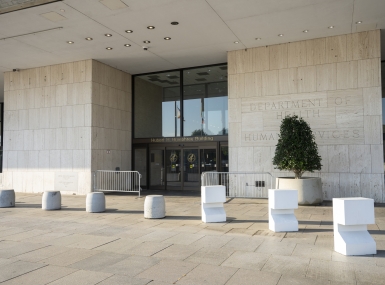After the Senate blinked, what’s next for health care?
Upcoming Events
Related News
Stakes high as Congress turns to reauthorizing health care programs
As the wait continues to determine what Congress may do next in relation to the Affordable Care Act (ACA), a series of health programs must be reauthorized by Congress through regular congressional process before the end of this fiscal year (Sept. 30).
All of the programs will likely be rolled into one piece of legislation, providing Congress with another opportunity to advance its health priorities.
The stakes will be high as Congress will only have 12 legislative days to craft and pass bills before these series of health programs expire. These programs represent another legislative vehicle in which Congress could attach other health-related policies. However, unlike the recent effort to pass major health reforms under budget reconciliation, 60 votes in the Senate will be necessary and would require the support of at least eight Democrats.
Programs of most relevance to counties that need reauthorization include the Children’s Health Insurance Program (CHIP), the Maternal, Infant, Early Childhood Home Visiting (MIECHV) Program, Community Health Center funding and Disproportionate Share Hospital (DSH) reductions.
The Children’s Health Insurance Program
The Children’s Health Insurance Program (CHIP) is a federal-state program that provides health insurance to children in families with incomes that are modest but too high to qualify for Medicaid.
First enacted in 1997, CHIP was last reauthorized through the Medicare Access and CHIP Reauthorization Act (MACRA) of 2015 which provided federal funding to the program for FY2016 and FY2017 at $19.3 billion and $20.4 billion, respectively.
The program now covers over 8 million children and along with Medicaid — which covers over 30 million children — has led to a 95 percent insured rate for U.S. children.
State budget cycles and regulations make it difficult for states to maintain their CHIP programs in the absence of federal funding certainty.
Without a guarantee that CHIP funding will be extended, states may take action to limit enrollment, impose lock-outs and waiting periods, or wind down their programs altogether.
A recent report by the Medicaid and CHIP Payment and Access Commission (MACPAC) indicates that at least four states (Arizona, California, Minnesota, North Carolina) and the District of Columbia will completely exhaust funds for CHIP by the end of the year if Congress does not act. More than half of all states will exhaust their funds by March 2018.
The Maternal, Infant, Early Childhood, Home Visiting Program
The Maternal, Infant, Early Childhood, Home Visiting (MIECHV) Program provides resources and support for pregnant women, families and at-risk parents of children under the age of five. Families participate voluntarily in home visits conducted by nurses, mental health clinicians, social workers and others with specialized training. In FY2015, the program supported more than 145,000 individual parents and children, and conducted over 900,000 home visits.
Although states are the primary recipient of home visitation program funding — which currently totals about $400 million annually — resources are typically passed on from states to counties to operate local programs. Counties often employ public health nurses to conduct visits or contract with local social service nonprofits to provide these services.
MIECHV is critical to helping counties improve maternal and child health, prevent child abuse and neglect, encourage positive parenting and promote child development and school readiness.
Community Health Centers
Community Health Centers provide primary health services for over 25 million people in counties across the country. The 1,200 neighborhood health centers generally serve mdically underserved areas, or MUAs, which include areas where people have little access to primary health care and individuals who are uninsured, underinsured or low-income.
The Health Center Program is administered by the Health Resources and Services Administration within the Department of Health and Human Services, which award grants to outpatient health care facilities.
The Community Health Centers Fund, which was first established under the Affordable Care Act and later extended through the Medicare Access and CHIP Reauthorization Act of 2015, now provides $3.6 billion annually, or more than 70 percent of federal funding, for the health centers. These funds have been used for a range of health center activities including funding new health centers, increasing services provided at existing health centers, and implementing care coordination initiatives.
In addition, the fund supports the National Health Service Corps, a scholarship and loan repayment program that places providers in underserved areas including at health centers.
Disproportionate Share Hospital Payments
Many of the approximately 900 county-supported hospitals across the country receive partial compensation from the U.S. government for treating indigent patients in the form of Disproportionate Share Hospital (DSH) payments. The Affordable Care Act reduced federal DSH allotments to account for decreases in uncompensated care anticipated as a result of Medicaid expansion. However, not all states expanded Medicaid and there are still 28 million uninsured.
Since the implementation of the ACA, several laws have amended the ACA to delay the Medicaid DSH reductions to prevent funding cuts to these hospitals that serve a large proportion of uninsured and Medicaid beneficiaries. Most recently, MACRA delayed DSH reductions by one year, by eliminating the FY2017 DSH reductions.
However, without additional delays DSH cuts will begin in FY2018 and extend through FY2025 — and would total $43 billion.
For now, repeal and replace efforts in Congress appear unlikely as lawmakers turn their attention to other urgent budgetary and policy priorities before Sept. 30.
Although President Trump can still act without Congress to alter certain ACA provisions, such as enforcing the individual mandate, the White House is under pressure to deliver on major tax reform and infrastructure packages that they hope to advance quickly through Congress this year.
NACo will continue to monitor legislative and budgetary developments on these important health programs and ensure that county interests are represented in any upcoming legislation.
Attachments
Related News

U.S. Department of Health and Human Services announces major restructuring
On March 27, the U.S. Department of Health and Human Services (HHS) announced a sweeping reorganization that will consolidate agencies, shift key programs under a new framework and eliminate thousands of positions. This change brings HHS in line with President Trump's Executive Order, “Implementing the President’s ‘Department of Government Efficiency’ Workforce Optimization Initiative.”

U.S. Department of Health and Human Services moves to reduce public comment in rulemaking
On February 28, the U.S. Department of Health and Human Services (HHS) announced a policy change limiting public comment opportunities to only those required by law. Published in the Federal Register on March 3, the decision rescinds the “Richardson Waiver,” a 1971 directive from then-HHS Secretary Elliot Richardson that encouraged broader public input on regulations related to public benefits, grants and healthcare policies.

U.S. Department of Health and Human Services renews Public Health Emergency Declaration to address national opioid crisis
On March 18, the U.S. Department of Health and Human Services (HHS), under the direction of Secretary Robert F. Kennedy, Jr. renewed the public health emergency (PHE) declaration to address the ongoing opioid crisis, extending critical federal support for coordination, treatment expansion and research efforts. While overdose deaths have declined by 25.5 percent over the past year, synthetic opioids like fentanyl continue to drive fatalities, with approximately 150 Americans dying daily from overdoses.